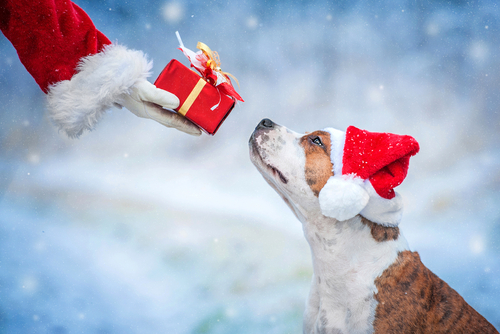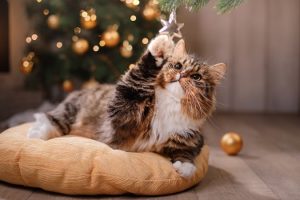The holidays always bring lots of cheer but there can be hidden hazards everywhere. We need to be vigilant to have a safe holiday, especially for our pets.
Who doesn’t love a beautifully decorated tree? We cannot stress enough to be very careful with choosing decorations. Garland and tinsel can he hazardous to cats and dogs. Cats and dogs love to play with ribbon, tinsel or garland and may chew and swallow it. If they consume it, it can become deadly trying to wind it’s way through the intestines. Glass ornaments can be a hazard if cats bat at them and they fall and break, or if dogs bite them and they break. They can cause cuts and potentially be a problem if ingested. The watering container for trees should be covered so your pets can’t drink from it. The water could contain fertilizer from the tree, or germs that may cause illness. Trees should be well anchored to prevent a rambunctious puppy or climbing kitty from knocking it over causing injury.
Chocolate can be hazardous as well. Milk chocolate contains “theobromine” which works very much like caffeine. Unsweetened or baker’s chocolate has approximately 8 times the amount. Too much caffeine can have detrimental effects on the heart. Even if your pet eats a non-toxic amount of chocolate it may cause diarrhea, vomiting and possible pancreatitis. If you put a wrapped box of chocolates under the tree be very careful that your dog can’t sniff them out and get into them.
If you think your pet has ingested chocolate, or anything else that could potentially be toxic, call your veterinarian right away, or Pet Poison Control at 1-855-764-7661. This is an American website. Fees apply.
Food: Small amounts of turkey or ham are usually not a problem, but can be if ingested in large amounts. Vomiting and diarrhea can results, and in some cases can turn into a nasty case of pancreatitis. The turkey carcass and/or bones discarded in the trash are always a danger so be sure to dispose of them safely. Cooked bones splinter easily and can cause an obstruction or perforation of the intestines.
Electrical cords for Christmas lights are always a concern, too. Pets biting them can receive a nasty shock or burn. Be sure they aren’t hanging loose anywhere that your pet may get a hold of them.
Poinsettia plants, contrary to popular belief are not toxic to cats and dogs. They can, however, cause irritation to the mouth and stomach if eaten. Mistletoe can be toxic, depending on the type. Some are similar to the Poinsettia in nature while some can cause severe illness. It’s difficult to know which type is which so it’s best to avoid mistletoe altogether.
Having guests over can be stressful for our pets, too. If you have cats that never go outside you may want to make all your guests aware of this, and to watch for escapees if the doors are opened frequently. Putting cats in a safe, quiet room is a good idea. Dogs may need a quiet spot away from guests where they can feel safe. If your dog is extra nervous with the activities there are a number of different remedies to help calm your pet during this potentially stressful time. Let us know if you think your pet may benefit from a little help.
If you have any questions about possible hazards don’t hesitate to call us. We want everyone’s holiday time to be safe and happy!



